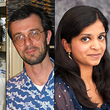Featured Student Research
Our students frequently publish their work in highly regarded peer-reviewed journals. The sampling below demonstrates the variety of high-impact research to which our students contribute.

Gilliam Graduate Fellowship
Brian St. Hilaire was recently awarded a Howard Huges Medical Institute Gilliam Graduate Fellowship. Brian is in his second year of graduate school and is working in the laboratory of Dr. Erez Lieberman Aiden.

Improved understanding of cell-cell communication
Scientists have improved their understanding of a new form of cell-cell communication that is based on extracellular RNA (exRNA). RNA, a molecule that was thought to only exist inside cells, now is known to also exist outside cells and participate in a cell-cell communication system that delivers messages throughout the body. To better understand this system, the National Institutes of Health Common Funds Extracellular RNA Communication Consortium, which includes researchers from Baylor College of Medicine, created the exRNA Atlas resource, the first detailed catalog of human exRNAs in bodily fluids. They also developed web-accessible computational tools other researchers can use to analyze exRNAs from their own data. The study, published in the journal Cell, contributes the first ‘map of the terrain’ that will enable scientists to study the potential roles exRNA plays in health and disease. Baylor graduate student, Oscar Murillo is the first author on this paper. Aleksandar Milosavljevic was the principal investigator.

17p11.2 syndromes
Having duplications or deletions of an entire group of genes spells trouble for living organisms. Potocki-Lupski syndrome, for instance, is a condition that results from having an extra copy of a small piece of chromosome 17 – 17p11.2 – in each cell. A different condition, known as Smith-Magenis syndrome, results when a similar small piece of chromosome 17 is deleted. It was thought that these conditions occurred because of the imbalance in the genetic information contained in the altered piece of chromosome 17, but researchers in the lab of Dr. James R. Lupski and their colleagues have discovered that much more is going on than deletions or duplications. Xiaofei Song, a graduate student in Dr. Lupski's lab, was a co-author on this paper.

E. coli shows the way to cell-made protein carcinogens
Baylor researchers discovered a new major class of cancer-promoting genes by showing that many normal proteins made by our cells can act like carcinogens, damaged DNA and causing mutations. Former graduate student and current postdoctoral associate at Baylor, Dr. Jun Xia was one of the two co-first authors on this study. Susan M. Rosenberg was the principal investigator.

Finding microRNA candidates linked to disease
What started as Ninad Oak’s side project turned out into something much larger, his doctorate thesis. “The project started as my qualifying exam that I proposed at the end of my first year of graduate school,” said Oak, a graduate student in Dr. Sharon E. Plon’s lab. “This was an off-topic qualifying exam at the time, meaning the lab had not worked on this topic before.”

Mutant PPM1D gives stem cells survival advantage
Although chemotherapy can fight back cancer, it also has been associated with increased risk of leukemia years after the treatment. What leads to that association is not clear, but a recent report has provided some answers. The answers involve a gene calledPPM1D, whose function in blood production was unknown. Furthermore, the implications of these findings can affect the choice of chemotherapies. The journey that led to these findings began on the bedside and then moved into the research lab, highlighting the importance of collaboration between clinical and basic science researchers. Baylor M.D./Ph.D. student, Joanne Ino Hsu participated in this research. Margaret A. Goodell was the principal investigator.

Novel structure found in light-sensing neurons
Graduate student, Rachayata Dharmat, her mentor, Dr. Rui Chen and colleagues discovered that the antennae-like structures on light-sensing neurons, called photoreceptors, have a unique feature not observed in the ‘antennae’ or cilia of other types of cells.

What matters the most to cells
A study in Nature, authored by graduate student, Priya Sivaramakrishnan, her mentor, Dr. Christophe Herman and colleagues, demonstrated that accurately transcribing DNA overrides DNA repair.







